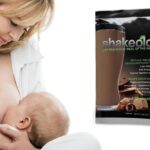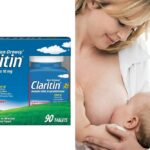Pregnant women and breastfeeding women are encouraged to eat more protein every day. In fact, they should be consuming at least an extra 25 grams of protein per day.
That’s a pretty tall order for people that don’t care for protein-rich foods, get sick looking at them, or for those that live a vegan lifestyle. Thankfully, you can get plenty of protein from protein shakes and powders! These are considered safe while you’re breastfeeding.
Protein Powder Should Not Be Your Only Source Of Protein
I asked my daughter’s obstetrician about this when she was pregnant because she simply wasn’t eating enough protein. She said that protein shakes or powders are a great addition to a healthy diet.
However, they should be used as a supplement, not to meet all of your protein needs. I asked her the same thing for breastfeeding women before writing this article, and she once again stated that it simply shouldn’t be used to meet all of your protein needs, but can be used as a supplement.
How Much Protein Do Breastfeeding Mothers Need?
On average, breastfeeding mothers will need at least 65 grams of protein per day. Although eggs are considered a great source of protein, one egg only contains six grams of protein. Just eating eggs, you would need to eat almost a dozen eggs per day to meet your daily requirement.
Meat is an exceptional source of protein. An average boneless porkchop can have 52 grams of protein in it. This means that most women can meet their daily requirements by eating a healthy dose of meat every day.
Vegan women are going to have to eat more protein to reach that same daily requirement. For example, one cup of lentils contains approximately 18 grams of protein. Depending on how much you like lentils, that may or may not be a problem.
Foods That Have Protein
Because you need to get at least some of your protein from foods that you eat, it’s important to include at least a few protein-rich foods in your diet.
A couple of scrambled eggs won’t meet your protein needs, but they can be an addition to protein powder. Other foods that have protein include, but are not limited to:
- Meat
- Fish
- Eggs
- Lentils
- Almonds
- Oats
- Cottage cheese
- Soy milk
View in gallery
You’ll find that most foods that are high in protein are in the meat and dairy categories. If you’re vegan, don’t lose hope. These fruits and vegetables are also considered higher in protein:
- Broccoli
- Spinach
- Artichokes
- Sweet potatoes
- Guava
You’ll need to eat more of these foods, but if you’re already eating a vegan diet that might not be a problem.
Benefits Of Using Protein Powder While Breastfeeding
- All Organic & Plant-Based Protein: Our organic plant-based protein powder formula is made from all-natural ingredients including 21 grams of protein and 4 grams of carbs, all the while being completely vegan. We include 20+ superfoods for added micronutrients and all essential amino acids to ensure you get the most out of your post-workout routine.
Prices pulled from the Amazon Product Advertising API on:
Product prices and availability are accurate as of the date/time indicated and are subject to change. Any price and availability information displayed on [relevant Amazon Site(s), as applicable] at the time of purchase will apply to the purchase of this product.
Protein powder is extremely popular among breastfeeding mothers.
More and more companies are opting for organic ingredients to give breastfeeding mothers the healthiest choices that they can. There are quite a few benefits to picking up some protein powder while you’re nursing your little one.
You’ll Always Meet Your Daily Requirement
A few scoops of protein powder a day can help you meet your daily requirement. Even if you’re trying to get all of your protein from your diet, this can help you reach that goal while you figure out what foods to eat in order to get enough protein.
On days that you’re too tired to cook chicken or are sick, protein powder can help keep you healthy.
Plenty Of Protein Powder Options
The world of protein powder has come a long way. There are vegan options, organic options, and several flavors available. You can easily find something that you like, and that suits your current lifestyle.
They Can Help With Your Milk Supply
Keeping up with your milk supply is one reason that breastfeeding mothers need so much protein. It is passed through the mom’s body, through the breastmilk, and helps your baby grow to be a healthy weight.
When moms don’t have enough protein in their bodies, it can result in not having a consistent milk supply that is always enough.
Companies like Milk Dust have taken things a step further. Some of their protein powders specifically include ingredients that can help nursing mothers naturally increase their milk supply.
View in gallery
Things To Watch Out For When Using Protein Powder While Breastfeeding
Protein powder is considered a supplement, which means that you’ll need to keep a few things in mind before simply picking a protein powder in a delicious flavor. Make sure that you consider these things before clicking the buy now button.
Supplements Are Not Regulated By The FDA
While most companies want to give customers a healthy product, there are a lot of cheaper brands that want to make a quick buck.
You might wind up with a lower quality product that doesn’t have as much protein as it claims to, or it might contain harmful toxins. Do your research on a company before buying things from them.
Not All Protein Powders Are The Same
Most companies include other ingredients in their protein powders. For example, a protein powder that is designed for bodybuilders might include more vitamins and things to both increase energy and increase muscle.
You obviously don’t need all of that. Some protein powders for breastfeeding mothers also contain plenty of ingredients to increase milk supply.
Moms that have a healthy milk supply that uses these protein powders might find that they start producing too much milk. Make sure that you consider what you need in a protein powder before buying one.
Not All Companies Test For Heavy Metals
Not only do some companies not test for heavy metals, but they also are not required to.
Because of that, you should make sure that you avoid any product that has a metallic taste. Also, make sure that you research a company before purchasing protein powder from them.
In Conclusion
Protein powders are generally considered safe for breastfeeding mothers. However, make sure that you choose a high-quality product. You should also use protein powders as a supplement instead of your only source of protein.








